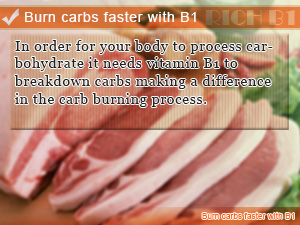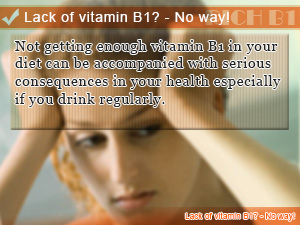Foods rich in vitamin B1 with the highest nutritional value help in burning carbs as well as preventing health threatening lack of vitamin B1 in your diet. Vitamin rich foods in vitamin B1 such as peanuts, soybeans, and wheat germ give you more options when taking on the ever daunting task of balancing your diet.
What foods are rich in vitamin B1?
There are lots of vitamins that can't be put together inside your body using nutrition broken down from the food you eat. Vitamin B1 is such a vitamin. When you are on a diet trying to limit your food intake to lower calories, the food you eat can turn one-sided. This may be one such cause of vitamin deficiency in your diet.
Lack of vitamin B1 in your diet may trigger health problems later on making hard or even impossible to continue on with your diet without having your health grow poor. It turns out there are many vitamin B1 foods to choose from.
In this healthy Slism, we will discuss vitamin B1 benefits and side effects of lack of vitamin B1 in your diet while presenting a foods list of various sources of vitamin B1.
What Is Vitamin B1 Good For? - Vitamin B1 Benefits
Vitamin B1 also known as thiamine is a water soluble vitamin first discovered by the Japanese scientist Umetearo Suzuki studying how rice bran can be used to cure people affected by beriberi in 1910.
It works as a coenzyme that helps your body metabolize sugars. That is to say it plays an important role in burning carbs. Lack of vitamin B1 could be the cause of beriberi and even Wernicke's encephalopathy.
Getting enough vitamin B1 in your diet helps aid in fatigue recover, and the breakdown of sugars. However, the most notable benefit of getting enough vitamin B1 is treating the lack thereof. Vitamin B1 aids in burning carbs and is essential for maintaining the health of your skin.
To get vitamin B1 in your body right away with enhanced nutrient absorption eat Japanese leek, garlic, onions, or any other food containing Allicin. Consumption of Allicin foods is said to aid in the nutrient absorption of vitamin B1.
Top 5 - Foods Rich in Vitamin B1: Sources of Nutrition
Vitamin B1 can be found in vegetables as well as animal nutritional sources. Having many option help you balance your diet. Here are the main nutrition sources of vitamin B1 to get started with.
Meats and Poultry
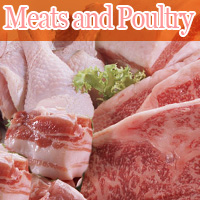
Although meat and poultry are known as good sources of protein, thigh and filet parts are said to be high in vitamin B1 in addition to being an all-around source of nutrition.
However, since most meats are eaten cooked well done and seldom eaten rare, chances are that you don't get the vitamin B1 you set out to just by eating meat. As you may know by now, vitamin B1 is water soluble. That means when cooked the nutritional value of vitamin B1 decreases.
One way to ensure that you get the vitamin B1 your need is to minimize the effect of heating or improve nutrient absorption of vitamin B1 by eating foods with Allicin that are: garlic and onions.
Grains
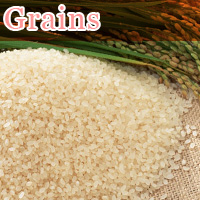
Any food containing wheat or byproducts of rice are considered good sources of vitamin B1. In particular, wheat germ is considered to be the food highest in vitamin B1 in grains.
However, that doesn't mean you should use wheat germ to make everything you eat. There are all kinds of foods you can eat to prevent lack of vitamin B1.
Since vitamin B1 helps in burning carbs turning food like grains quickly into energy your body can use right away, consumption of vitamin B1 is recommended while eating carbohydrate foods and vice versa. On the other hand, the amount of vitamin B1 contains in grains is said to be not enough.
Getting vitamin B1 from other food sources in addition to grains is highly recommended.
Seaweed

When it comes to vitamin B1 seaweed foods, there is no better choice than nori seaweed.
Getting vitamin B1 in your diet to aid in burning carbs is one benefits of eating sushi that is often found wrapped in nori. Food combinations like these are great if you worry about your carb intake or just want to avoid unhealthy lack of vitamin B1.
Soy Products
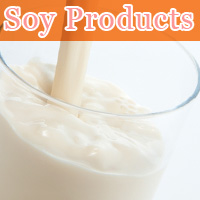
Soy beans and edamame are considered good sources of vitamin B1. Soy products like edamame soybeans are not only high in vitamin B1 but easy to find to add to any meal turning snacking into a healthy way to get on top of vitamin B1 intake.
In addition to being a good source of vitamin B1, soy products are known for their isoflavone and saponins as well as high quality protein.
Nuts
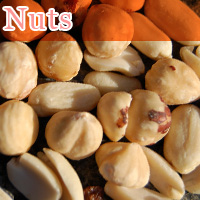
Nuts at the same time as being high in fat and calories give you vitamin B1 your need to burn carbs and prevent lack of vitamin B1. However, eating too much nuts may results in unwanted weight gains.
When consuming low calorie nuts while you are on a diet, do keep in mind the amount of calories you consume.
List of Foods High In Vitamin B1 – Foods List
The below table shows you what foods contain high nutritional value of vitamin B1 to get a better grasp on how much of your diet should be geared towards getting enough vitamin B1. Food items contain links to pages where addition nutritional information and calories can be obtained.
Foods with Vitamin B1
| Food (Meats & Poultry) | Amount | Food (Vegetables) | Amount |
|---|---|---|---|
| Medium Pork Filet | 1.22mg | Peanuts |
0.85mg |
| Large Pork Filet | 0.98mg | Soy Beans | 0.83mg |
| Large Pork Thigh | 0.96mg | Wheat Germ | 1.82mg |
| Suppon Turtle | 0.91mg | Sunflower Seeds | 1.72mg |
| Boneless Ham | 0.90mg | Baked Seaweed | 0.69mg |
| Dry Cured Ham | 0.92mg | Green Peas | 0.72mg |
| Pork Ribs | 0.54mg | Fava Beans | 0.5mg |
| Pork Liver | 0.34mg | Sesame Seeds | 0.95mg |
| Chicken Liver | 0.38mg | Buckwheat Flour | 0.16mg |
| Japanese Eel Kabayaki | 0.75mg | Durian | 0.33mg |
| Cod Roe | 0.71mg | Brown Rice | 0.16mg |
| Salmon | 0.26mg | White Rice | 0.08mg |
| Japanese Amberjack | 0.23mg | Steamed Rice | 0.02mg |
* Vitamin B1 content in Japanese food data taken from Standard Tables of Food Composition in Japan, 2010
How Much Vitamin B1 Do You Really Need?
As you may know by now, proper brain and body function is affected by how much vitamin B1 you get in your diet. For people who lack vitamin B1 in their diet, all that waits is beriberi and Wernicke's encephalopathy, two conditions you don't want to get to know better.
The recommended amount of vitamin B1 you should be getting in your diet each day is 1.4mg for men and 1.1mg for women between the ages 18 and 29. *Japanese Daily Intake
Who would have thought that getting one vitamin had so much an effect on your health than vitamin B1? If you've made it this for without suffering from conditions such as beriberi, then you may be doing something right in your diet. That still doesn't mean you shouldn't monitor your vitamin B1 intake guaranteeing no lack of vitamin B1 in addition to enhanced carb burning.







